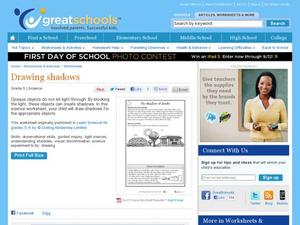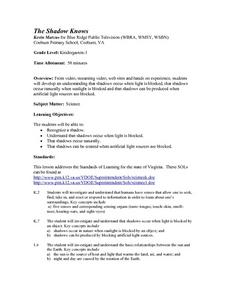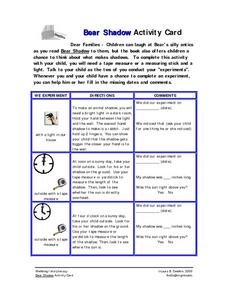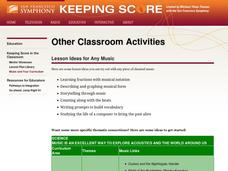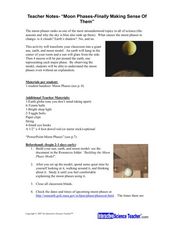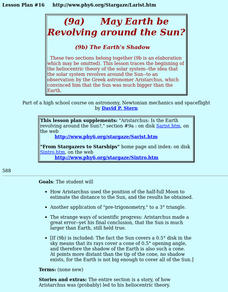Curated OER
Sun and Shadows
Why do shadows look different in the summer than in the winter? What causes day and night? How can a sundial be used to tell time? Answer these questions and more through two engaging lessons about light and shadows. Fourth and fifth...
Curated OER
Being Shadowed
What causes a shadow to appear? Have kindergartners and first graders explore shadows with a fun science activity. After reading a short paragraph about light sources, they draw a shadow for a little girl based on the location of the...
Curated OER
No Shadow of Doubt
Fifth graders must use a pencil to draw in the shadows they think will be formed by a house, a greenhouse, and a tree. The sun is behind each of these objects, and an open field is in front of them. That's where pupils draw their...
Curated OER
Hello Sun, Goodnight Moon
Students become familiar with different times around the world through the reading of 9 O'clock Lullaby. In this Earth, sun, moon lesson, students recognize the movement of the Earth and the relationship to the sun and the...
Curated OER
The Shadow Knows - Creating Shadows
Young learners recognize a shadow and witness how shadows occur when light is blocked. They access streamed video, standard video, and websites in order to engage in their study of how light is naturally blocked to create shadows. An...
Curated OER
Cooler in the Shadows
Students explore Earth science by creating a scale model in class. In this shadow lesson plan, students research the impact the sun has on Earth shadows and complete a space science worksheet. Students create models of the Sun and Earth...
Curated OER
Science Trail
Learners explore the solar system by conducting Earth science experiments. In this Sun instructional activity, students identify the different seasons on Earth and discuss their purpose and cause. Learners create a sundial and observe...
Curated OER
Sky 2: Shadows
Students explore space science by participating in a shadow experiment. In this sky observation lesson, students identify how the sun creates different sized shadows by moving across the horizon. Students utilize yard sticks, markers,...
Curated OER
"Bear Shadow" Activity Card
In this literature and science worksheet, students listen to a family member as they read "Bear Shadow." They conduct experiments that with light, shadows, and measuring tools before recording the date they did the experiment. They...
Curated OER
Light and Shadows
In this earth science worksheet, students examine 6 pictures that show the sun in relation to a tree. They also see a clock and the time. They look at the position of the sun and draw the shadow of the tree in the proper position.
Curated OER
Sun, Shadows, Surface Structure...and the Face on Mars
Students use light and shadow information to make inferences regarding the three dimensional shapes of specific objects photographed on the surface of Mars. Limitations of the of the data provided are discussed and entries made into the...
Curated OER
Cameras and Shadows
Students discover how light creates shadows by photographing them with a camera. In this sunlight lesson, students utilize the light in the sky to create different shadows of themselves and objects near their classroom,...
San Francisco Symphony
Lesson Ideas for Any Music
Music is a wonderful tool you can add to enhance the learning process for every subject. Here is a list of music selections that are categorized by subject, along with some neat teaching suggestions. You'll find songs suited to...
Curated OER
Moon Phases - Finally Making Sense of Them
Young scholars investigate the different phases of the moon. In this lunar cycle lesson, students create models of the sun, earth and moon and investigate why we observe the moon the way we do. Young scholars observe a...
Curated OER
May The Earth Be Revolving Around The Sun?
Students trace the beginning of the heliocentric theory of the solar system--the idea that the solar system revolves around the Sun--to an observation by the Greek astronomer Aristarchus, which convinced him that the Sun was much bigger...
Curated OER
A Moon with a View
Third graders explore the rotation of Earth and the moon. In this solar system lesson, 3rd graders participate in an Earth and moon simulation in which part of the class "becomes" the sun, while other children represent the moon by...
Curated OER
Characteristics of Materials
Students describe and compare common properties of various classroom materials. In this science/matter lesson, students observe common classroom items and the materials they are made of to complete a list of common properties.
Curated OER
Groundhog Day Craft
For this Groundhog Day craft worksheet, 1st graders cut and paste the 3 pictures of the sun, a groundhog and a tree onto another sheet of paper, then draw the shadows of the groundhog and the tree.
Curated OER
Water and Ice
Students explore water and ice. In this 3 states of matter lesson, students work with a partner to observe, illustrate, and describe the characteristics of an ice cube in a cup. The ice cube is observed again in 15 minutes and changes...
Curated OER
UV Beads
Students recognize preventitive measures that can be taken to reduce the risks associated with exposure to solar radiation. They explain why solar radiation can be harmful. They utilize beads that turn color when exposed to UV rays. Good...
Curated OER
Sorting and Using Materials
Learners explore materials and their properties. In this matter lesson, students identify objects and describe their properties. Learners test and sort materials using an interactive whiteboard, followed by a group discussion of what was...
Curated OER
Lunar Lollipops
Demonstrate the lunar cycle to youngsters using flashlights and lollipops. The procedure is somewhat vague, so it will need to be modeled for them before turning them loose to try it. The questions that follow the activity are not...
Curated OER
Celebrate The Four Seasons
Students investigate cause and effect and compare and contrast how recurring cycles are evident in multiple aspects of their education. They answer questions in the chosen field. Students model each aspect by interpreting, perceiving and...


